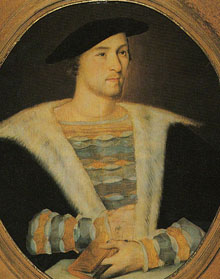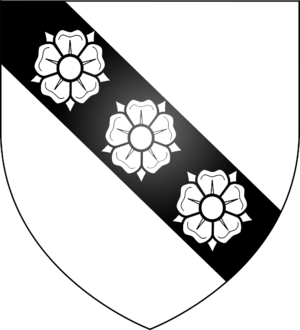William Carey (courtier) facts for kids
Quick facts for kids
William Carey
|
|
|---|---|

William Carey, attributed to Hans Holbein the Younger. From a private Irish collection.
|
|
| Born | c. 1495 |
| Died | 22 June 1528 (aged 33) |
| Spouse(s) | |
| Children | Catherine Carey, Lady Knollys Henry Carey, 1st Baron Hunsdon |
| Parent(s) | Thomas Carey Margaret Spencer |
William Carey (born around 1495 – died June 22, 1528) was an important person at the court of King Henry VIII of England. He was a close friend and trusted helper of the King. William served as a Gentleman of the Privy chamber, which meant he was part of the King's personal staff. He was also an Esquire of the Body, a role that involved attending to the King directly.
William Carey's wife was Mary Boleyn. She is known in history for being very close to King Henry VIII. Mary was also the sister of Anne Boleyn, who became Henry VIII's second wife.
Contents
William Carey's Family Background
William Carey was the second son of Sir Thomas Carey and Margaret Spencer. His family, the Carys, were well-known in Devon, England. They had lived there for a long time.
William Carey was related to King Henry VIII. They were third cousins. This connection came through William's grandmother, Eleanor Beaufort, who was related to Henry VIII's grandmother, Margaret Beaufort.
William's aunt, Catherine Spencer, was the Countess of Northumberland. This made William a first cousin to Henry Percy. Henry Percy was known for being interested in William's sister-in-law, Anne Boleyn, before she met the King.
William Carey's Marriage and Court Life
On February 4, 1520, William Carey married Mary Boleyn. Mary was the older daughter of Thomas Boleyn, 1st Earl of Wiltshire. They lived in a place called Aldenham in Hertfordshire.
Soon after their marriage, Mary Boleyn became very close to King Henry VIII. Because of this connection, the Boleyn family received many gifts and lands from the King. William Carey also benefited greatly from this. He was given manors and estates by the King.
William Carey was also interested in art. He helped bring a famous Dutch artist named Lucas Horenbout to England in the mid-1520s. King Henry VIII liked sports and activities, and William Carey was also very active. He enjoyed riding horses, hunting, and jousting. William showed his skill in jousting at a famous event called the Field of the Cloth of Gold in 1520.
William Carey's Later Years and Death
After his relationship with Mary ended, King Henry VIII became interested in Mary's sister, Anne Boleyn. Henry proposed marriage to Anne in 1527.
Sadly, William Carey did not live long enough to see Anne Boleyn become Queen. He died on June 22, 1528, from a serious illness called the sweating sickness. This illness was common and very dangerous at the time.
After William's death, his family was left with many debts. His wife, Mary, even had to sell some of her jewelry. Later, Queen Anne Boleyn helped Mary by arranging a regular payment for her.
William Carey's Children
William Carey and Mary Boleyn had two children together:
- Catherine Carey (born around 1524 – died January 15, 1568). Catherine worked as a Maid of Honour for two of Henry VIII's queens. She married Sir Francis Knollys, who was a very important Puritan knight. Catherine later became a lady-in-waiting to her cousin, Elizabeth I. One of Catherine's daughters, Lettice Knollys, married Robert Dudley, 1st Earl of Leicester. He was a close friend of Queen Elizabeth I.
- Henry Carey, 1st Baron Hunsdon (born March 4, 1526 – died July 23, 1596). Queen Elizabeth I made Henry a baron shortly after she became queen. He also became a Knight of the Garter in 1561. When Henry was very ill, Queen Elizabeth offered him the title of Earl of Ormonde, which was a title from the Boleyn family that he had wanted for a long time. However, he refused the honor.
Some historians have wondered if Catherine and Henry might have been King Henry VIII's children, because of his close relationship with Mary Boleyn. This idea is still discussed by historians today.
 | Janet Taylor Pickett |
 | Synthia Saint James |
 | Howardena Pindell |
 | Faith Ringgold |


